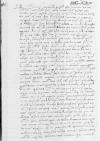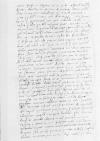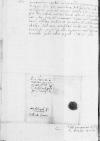Letter #2989
Karel UUTENHOVE to Ioannes DANTISCUSGhent (Gandavum), 1546-09-12
English register:
There has been a long silence between them, but Uutenhove has never ceased to remember Dantiscus and his excellent qualities. He has even often considered visiting Dantiscus in Poland.
One year ago it was rumoured that Dantiscus was deceased, but Dantiscus' inseparable companion, Cornelis De Schepper, Lord of Eke, removed their fears.
They were all delighted to hear that Dantiscus is alive and well and lives a quiet life, all the more since it is rare that someone can enjoy a well-deserved rest after a life of strenuous and successful activity. Uutenhove is doing well and has withdrawn from public life to devote himself to the Muses and sacred literature, in his estate of Markegem. Whenever requested, he will still fulfill his public duties. He also gives news of Dantiscus’ other acquaintances in Ghent: his host at the time, Arendt Sturm, is in his eighties and still in good health; he has resigned from his office.
His two daughters are happily married; Livina is the happier because she has numerous offspring. Uutenhove is even more fortunate, with six sons and one daughter alive, and the spouse that suits him. Dantiscus' former steward, Michiel De Vriendt, has married a rich, somewhat older woman. He lives a carefree life, without children. He misses no opportunity to praise Dantiscus, and asked Uutenhove to write in his name also. Robbius is living in Antwerp now; he married a second time and has many children. He remains himself and regularly sends witty letters. Lord Des Fosses sr., Willem De Waele and Lord Secretary [Omaar van Edingen] have died. About the courtiers Dantiscus will be informed by De Schepper or someone else from the court.
There is no further news worth mentioning except the incredible disaster that occurred in Mechelen on the night of 7 August 1546 during a heavy thunderstorm. One of the towers of the Sand Gate (Zandpoort), used as a storehouse for gunpowder, was struck by lightning. This caused a devastating explosion that destroyed the nearby Imperial Court, the recently built mansion of the Lord of Hoogstraten, the palace of Margaret of Austria, Saint Peters' church, and many other buildings, including the house of the Lord of Nassau, that of the treasurer, the house of the Lombards, the convent of the Augustines and most of the houses in the Voogdstraat. About 600 houses were destroyed, and not a single house in the town remained undamaged.
Flying pieces of stone sowed death and destruction everywhere. In the resulting consternation and distress, it was thought that the last judgment had come. There were only 200 deaths, but countless people were injured and mutilated.
It is said that the whole city trembled, and that shortly before the storm the howling of animals from the surrounding countryside was heard. The events were so gruesome that undoubtedly hordes of malevolent spirits were involved.
Stones were projected up to a mile outside the city, and fish flew up into the trees. A woman's head was cut off by a falling window. In a tavern that collapsed, card players were found dead, the cards still in their hands. Other people were rescued from the debris, terrified but unharmed. The reported events are amazing but true; others may even give Dantiscus a more extensive report.
| received Heilsberg (Lidzbark Warmiński), 1547-02-04 Manuscript sources:
Prints:
| ||||||||||||||
Text & apparatus & commentary Plain text Text & commentary Text & apparatus Excerpts concerning Dantiscus' travels
Et litteris, et omni virtutum genere ornatissimo Domino
Ubi, ubi fuerit.
Salutem plurimam.
Tametsi, Reverende Praesul, altum omnino inter nos silentium iamdudum fuit, adeo tamen (Deum testor) non excidit menti nostrae Dantisci numquam satis laudata virtus, ut etiam non raro illius humanitas, comitas ac morum insignis decor (vel in summis) obversentur mihi. Et quod eo magis sic saepe benevolentiae ac tui desiderio oestro concitus fui, ut de petenda
Iam alter agitur annus, ni fallor, quo hic rumor fuit te vita defunctum fuisse, sed ex hoc metu iam pridem nos liberavit dominus
De me vero quid agatur, si forte rogas, scias. Imprimis valere me quidem atque ita instituisse vitam, ut a publicis negotiis, quantum potuerim, me subtraxerim, ac in
Reliqui  UUB, H. 154, f. 138v
sobolem numerosiorem protulit. Ego tamen hac in parte utramque vinco, ut cui modo sex superstites sunt
UUB, H. 154, f. 138v
sobolem numerosiorem protulit. Ego tamen hac in parte utramque vinco, ut cui modo sex superstites sunt
Ego si quid habuissem, quod tibi gratum aut acceptum fore fuissem arbitratus, transcripsissem. Id, quicquid est sit, sit tibi veluti nostrae erga te benevolentiae pignus obsecro. Nam novarum hic rerum nihil est, quod scribi possit, praeter id unum memorab<i>le ac paene incredibile, quod paucis hidden by binding⌈[is]is hidden by binding⌉ ab hinc diebus accidit  UUB, H. 154, f. 139r
miris impensis ac sumptibus non ita pridem constructa fuerat. Deiecta est et huic non inferior domus[1] quondam divae
UUB, H. 154, f. 139r
miris impensis ac sumptibus non ita pridem constructa fuerat. Deiecta est et huic non inferior domus[1] quondam divae
Tota
Aiunt totam tremuisse  UUB, H. 154, f. 139v
extr<a>herentur, rogabant, num qui adhuc superstites essent.
UUB, H. 154, f. 139v
extr<a>herentur, rogabant, num qui adhuc superstites essent.
Magna sunt, quae narramus, sed profecto maiora his hidden by binding⌈[s]s hidden by binding⌉ contigerunt, quae omnia persequi prolixum esset. Tu, quaeso, et fidem his habeas (nam res certa est et testium apud nos plus satis), et narrationem hanc parum comodam boni consulas. Audies ea fortassis luculentius narrata hidden by binding⌈[a]a hidden by binding⌉ ab aliis. Salutant te officiose tui hic omnes.
Bene vale, ornatissime praesul, et nos numero tuorum asscribe.
Tuae Paternitati deditissimus



